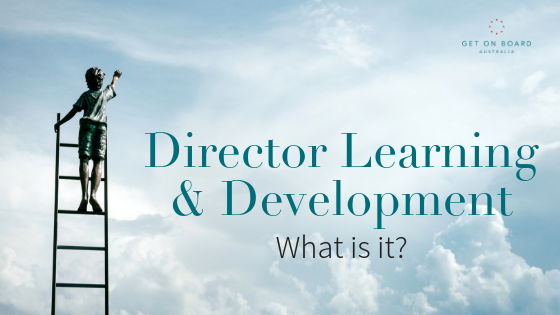Director Learning and Development: What is it?

In our last post we shared why continued learning and development was important and necessary for directors, boards, and the organisations they serve.
This post looks at the types of director education available and the learning and development options that boards and board members have.
Basic Training
Like any specialist area, there is a minimum level of knowledge and skill required. For a company director, these include the roles, duties, and responsibilities of the board and directors, corporate governance (defined by Wikipedia as broadly referring to “… the mechanisms, processes and relations by which corporations are controlled and directed”), risk management, and finance. Having a firm understanding of these fundamentals is important for all directors of any organisation.
What is also important is staying up to date with these essentials; with ever-changing and evolving legislation, business practices, standards, and expectations it is easy to fall behind, leaving you and your organisation open to risk.
Supporting Skills
One of the primary roles of a board is to be involved in the strategic planning process. Add to this stakeholder relations, corporate social responsibility, management relationships, setting board and organisation culture, meeting processes, board committees, and key board roles (Chair, Deputy Chair, Treasurer, Secretary) and you start to recognise the complexities of being a director and sitting on a board go far beyond pure ‘governance’ activities.
Understanding and developing your skills, knowledge, and abilities in these areas will allow you to deliver a high level of value as a member of the board.
Peripheral Skills
Very high performing directors (and leaders for that matter) have highly developed peripheral, or ‘soft’ skills. These include high levels of personal leadership, political nous, questioning and challenging abilities, and confidence.
The importance of achieving necessary change, getting consensus on tough decisions, effectively debating issues, and generally having a high performance board requires that all directors have developed and honed these competencies.
Recognising that you may need improvement in any or all of these areas requires a high level of emotional intelligence (EQ) and self-awareness. (Subtext to this: if you don’t think you need help in any of these areas, you might want to start with some EQ training!).
Formal Training and Education Methods
A new and unique director development approach that we are leading in Australia involves delivering a brand new course (designed specifically for new and aspiring company directors and board members) in an online environment. The course was inspired from my own experiences of joining boards, seeking knowledge, and speaking to people in the same situation to me. This course is comprehensive and provides broad foundation knowledge for people who are wanting to join a board in the near future or are relatively new to boards (e.g. within the first five or so years). This style of course is new for the director development space and aims to break down the mystery surrounding the boardroom.
Not all education has to be formal; in fact most of your ongoing learning will come from informal sources. Other learning sources include MOOCs, reading, watching, or listening to information sources.
How do you know what education you need?
In addition to your own self-evaluation, most boards undertake a regular skills audit of all its directors. These two sources of information provide you with a fairly good idea on the areas that you need to further develop, and also where your strengths are so that you can continue to hone and build upon them.
If you’re still not sure of where you should be investing your education resources, engage the help of a trusted advisor who knows you well in a work and/or board capacity. They may be able to shed some light on areas that you may not have considered (those things that “you don’t know that you don’t know”).
Be prepared to push your own boundaries and capabilities – you may be surprised with what you can achieve with an open mind, some critical self-reflection, and a thirst for continued growth.
